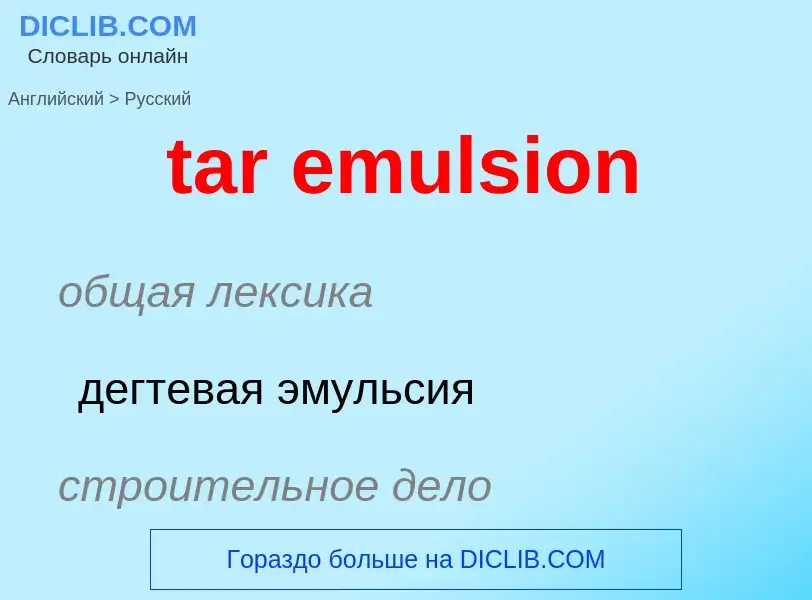Traducción y análisis de palabras por inteligencia artificial ChatGPT
En esta página puede obtener un análisis detallado de una palabra o frase, producido utilizando la mejor tecnología de inteligencia artificial hasta la fecha:
- cómo se usa la palabra
- frecuencia de uso
- se utiliza con más frecuencia en el habla oral o escrita
- opciones de traducción
- ejemplos de uso (varias frases con traducción)
- etimología
tar emulsion - traducción al ruso
общая лексика
дегтевая эмульсия
строительное дело
дёгтевая эмульсия
Definición
Wikipedia
Emulsion polymerization is a type of radical polymerization that usually starts with an emulsion incorporating water, monomer, and surfactant. The most common type of emulsion polymerization is an oil-in-water emulsion, in which droplets of monomer (the oil) are emulsified (with surfactants) in a continuous phase of water. Water-soluble polymers, such as certain polyvinyl alcohols or hydroxyethyl celluloses, can also be used to act as emulsifiers/stabilizers. The name "emulsion polymerization" is a misnomer that arises from a historical misconception. Rather than occurring in emulsion droplets, polymerization takes place in the latex/colloid particles that form spontaneously in the first few minutes of the process. These latex particles are typically 100 nm in size, and are made of many individual polymer chains. The particles are prevented from coagulating with each other because each particle is surrounded by the surfactant ('soap'); the charge on the surfactant repels other particles electrostatically. When water-soluble polymers are used as stabilizers instead of soap, the repulsion between particles arises because these water-soluble polymers form a 'hairy layer' around a particle that repels other particles, because pushing particles together would involve compressing these chains.
Emulsion polymerization is used to make several commercially important polymers. Many of these polymers are used as solid materials and must be isolated from the aqueous dispersion after polymerization. In other cases the dispersion itself is the end product. A dispersion resulting from emulsion polymerization is often called a latex (especially if derived from a synthetic rubber) or an emulsion (even though "emulsion" strictly speaking refers to a dispersion of an immiscible liquid in water). These emulsions find applications in adhesives, paints, paper coating and textile coatings. They are often preferred over solvent-based products in these applications due to the absence of volatile organic compounds (VOCs) in them.
Advantages of emulsion polymerization include:
- High molecular weight polymers can be made at fast polymerization rates. By contrast, in bulk and solution free-radical polymerization, there is a tradeoff between molecular weight and polymerization rate.
- The continuous water phase is an excellent conductor of heat, enabling fast polymerization rates without loss of temperature control.
- Since polymer molecules are contained within the particles, the viscosity of the reaction medium remains close to that of water and is not dependent on molecular weight.
- The final product can be used as is and does not generally need to be altered or processed.
Disadvantages of emulsion polymerization include:
- Surfactants and other polymerization adjuvants remain in the polymer or are difficult to remove
- For dry (isolated) polymers, water removal is an energy-intensive process
- Emulsion polymerizations are usually designed to operate at high conversion of monomer to polymer. This can result in significant chain transfer to polymer.
- Can not be used for condensation, ionic, or Ziegler-Natta polymerization, although some exceptions are known.


![A New Method of Macarony Making As Practiced at [[Boston]]. Date made: 1830 Maker: Pendleton's Lithography; Johnston, David Claypoole Place: Boston, Massachusetts Description: Black and white print; outdoor scene of three men standing in front of a gallows with a broken rope hanging from the gallows. One man is tarred and feathered from the neck down and has the other half of the broken rope around his neck. A New Method of Macarony Making As Practiced at [[Boston]]. Date made: 1830 Maker: Pendleton's Lithography; Johnston, David Claypoole Place: Boston, Massachusetts Description: Black and white print; outdoor scene of three men standing in front of a gallows with a broken rope hanging from the gallows. One man is tarred and feathered from the neck down and has the other half of the broken rope around his neck.](https://commons.wikimedia.org/wiki/Special:FilePath/Macarony Boston NMAH2003-25005.jpg?width=200)
![A boat transporting pine tar barrels on [[Oulu River]] in 1910. A boat transporting pine tar barrels on [[Oulu River]] in 1910.](https://commons.wikimedia.org/wiki/Special:FilePath/Tervavene 1910.jpg?width=200)
![Tar kiln at Trollskogen in [[Öland]], Sweden. Tar kiln at Trollskogen in [[Öland]], Sweden.](https://commons.wikimedia.org/wiki/Special:FilePath/Tjärdal 092.jpg?width=200)
